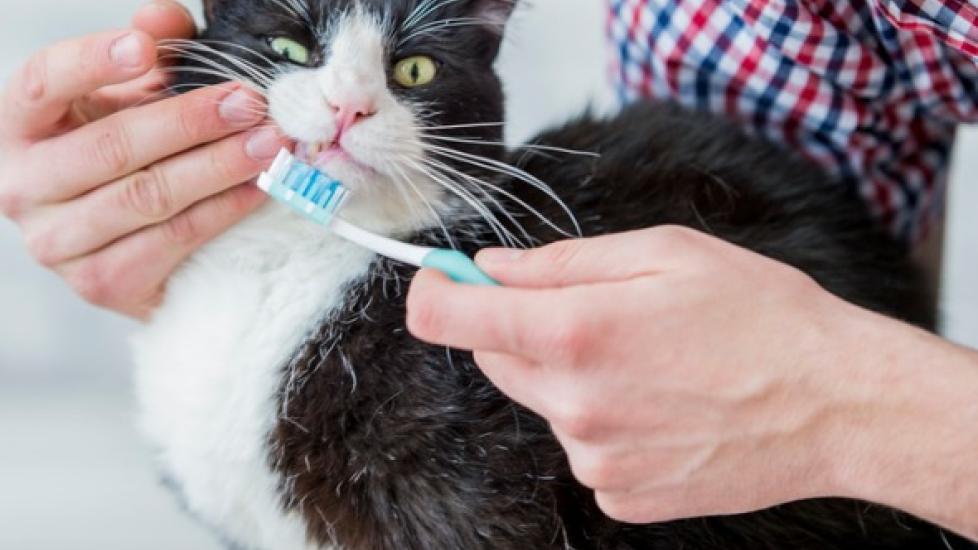How Often Should You Brush Dog Teeth and Cat Teeth?
Many of us can remember our parents telling us that we should brush our teeth twice a day and go to the dentist. We probably didn’t know it as little kids, but taking care of our oral health was an important part of taking care of our overall health.
Just like people, dogs and cats need to have healthy gums and teeth. Proper oral care for our pets includes brushing their teeth at home and taking them in for professional dental cleanings. Unfortunately, for a variety of reasons, many pet owners do not brush their pets’ teeth.
Poor dental care can cause many health problems. For example, many pets have dental disease by 2-3 years of age. Dental disease can lead to painful and swollen gums and even tooth loss.
To prevent serious dental disease, it is recommended to brush your pet’s teeth at home at least two to three times per week and take your pet for a professional dental cleaning once a year.
If you’ve never brushed your pet’s teeth, this article will help you learn the proper teeth-brushing technique.
Acclimate Your Pet
Your pet probably isn’t going to willingly let you brush his teeth the first time you stick a toothbrush in his mouth. Take some time to acclimate your pet to the process first by following these steps:
- Purchase your supplies. Human toothpaste can upset a pet’s stomach. Pet toothpaste, such as Vetoquinol poultry-flavored toothpaste, works great for cats and dogs. Toothbrushes for pets, such as the Woobamboo dog and cat toothbrush, are smaller than a human toothbrush and have softer bristles. Because cat teeth are so small, square gauze or cotton swabs could work to brush cat teeth if you don’t have a cat toothbrush.
- Massage your pet’s lips, teeth and gums. Situate your pet in a comfortable position. Using just your fingers, massage your pet’s lips in slow, circular motions for up to 1 minute once or twice a day. Next, massage his teeth and gums using the same motion. Your pet may need a few weeks to get comfortable with this massaging.
- Introduce the toothpaste. Once your pet is acclimated with a gum massage, you can introduce the toothpaste. Put a pea-sized amount of cat or dog toothpaste on one of your fingers and let your pet taste it, then immediately reward your pet with a treat. Over a few days, increase the amount of time between your pet tasting the toothpaste and being rewarded.
- Introduce the toothbrush. Put a small amount of pet toothpaste on the toothbrush and let your pet lick the toothbrush. Immediately reward him. Do this for several days, increasing the time between licking and the reward.
Brushing Your Pet’s Teeth
Once your pet has gotten acclimated, you can move forward with actually brushing his teeth. The process for brushing dog and cat teeth is largely the same, so you can use these steps with either a dog or cat.
- Clean the teeth in small, circular motions. Starting in one area of your pet’s mouth, gently lift the lip and clean the outside of the teeth and the gumline. Make the circular motions quick and smooth, and talk to your pet throughout.
- Clean the teeth in short intervals. Your pet probably won’t tolerate you cleaning his entire mouth at once. Stop every 5-10 seconds and give your pet some positive reinforcement, like petting or cheerful talking.
In total, it should take about 30 seconds to 1 minute to brush your pet’s teeth. Remember to keep the teeth-brushing session light and fun.
Teeth-Brushing Alternatives
Some pets, no matter what you do, will not let you brush their teeth. Fortunately, there are other dental care products that help keep a pet’s mouth healthy. For example, you could try a food and water additive like Pets Are Kids Too dental spray and water additive. You could also try dental chews for dogs and cats. Talk to your veterinarian if you are unsure which teeth-brushing alternative to try.
In summary, do your best to make brushing your pet’s teeth an enjoyable experience, but don’t hesitate to reach out to your veterinarian if you’re having trouble with it. Remember that the better care you take of your pet’s teeth at home, the healthier your pet will be.
Featured Image: iStock.com/Fat Camera
Help us make PetMD better
Was this article helpful?
